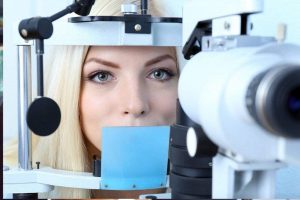If over-the-counter allergy eye drops do not relieve your dry, itchy eyes, it may be time to schedule an appointment with your eye doctor.
Common dry eye and eye allergy symptoms:
- Red eyes
- Itchy eyes
- Excessive tearing
- Gritty eyes
- Burning in eyes
- Eyelid inflammation
Eye allergies vs. dry eyes
Eye allergies, also known as allergic conjunctivitis, develop when the eyes react to certain allergens in the environment, such as dust, mold, pollen, and pet dander.
If your eye symptoms develop along with nasal congestion, sneezing, a runny nose or an itchy throat, there is a good chance that your eye symptoms are related to allergies.
Dry eyes develop when the quality or quantity of your tears are reduced.
In order to stay hydrated and moist, the eyes need to constantly produce new tears that consist of three layers: an oil layer, a mucus layer, and a water layer. If any of these layers are compromised, the quality of the tears will diminish. This can cause the tears to evaporate too quickly and consequently lead to dry eyes.
Dry eye symptoms, though similar to eye allergy symptoms, will also usually include eye pain, significant eye irritation and dryness.
Dry eye syndrome is a chronic condition that can be hereditary or caused by your environment, lifestyle habits, certain medications, or age.
If you feel you have allergy eyes, contact an eye doctor near you, who can diagnose and treat the condition.
SEE RELATED: Consequences of Untreated Dry Eyes
How are eye allergies and dry eyes treated?
Eye allergy treatments
If your symptoms are related to eye allergies, your eye doctor may recommend starting with over-the-counter (OTC) anti-allergy eye drops.
Your eye doctor may also discuss some lifestyle changes as well, to help you reduce your exposure to known allergens.
If OTC medications do not provide enough relief, medicated eye drops or oral medications will be prescribed to help control your allergy symptoms and alleviate your discomfort.
Can antihistamines worsen dry eyes?
Yes!
Anti-allergy eye drops contain an antihistamine to counteract the allergic response. Some anti-allergy eye drops may also include a formula to reduce redness and whiten the eyes.
But, while antihistamine eye drops can help reduce your eye allergies, it’s important to be aware that the medication in these drops can affect your tear production or cause your tears to evaporate too quickly. This can further dry out your eyes and worsen your condition.
For increased hydration and comfort while using anti-allergy eye drops, many eye doctors will also recommend using artificial tears. These are available as eyes drops, gels, and ointments and can be used as needed, throughout the day.
Dry eye treatments
Dry eye symptoms may require a different type of treatment plan, depending on the severity of your symptoms.
Your eye doctor may recommend an OTC artificial tears solution to keep your eyes moist and hydrated throughout the day, or may prescribe a medicated or steroid eye drop to alleviate severe dry eye symptoms.
In some cases, your eye doctor may recommend alternative in-office treatments, such as LipiFlow, True Tear, TearCare, punctal plugs, blephasteam, blephex, or intense pulse light (IPL) to alleviate chronic moderate to severe dry eye conditions.
When to see your eye doctor
With an eye exam, your eye doctor can carefully evaluate your symptoms and perform a variety of diagnostic tests to determine the cause of your discomfort and provide an effective treatment plan.
If left untreated, both eye conditions can cause significant discomfort and truly affect your quality of life.
If you are experiencing any symptoms of dry eyes or eye allergies, schedule an appointment with an eye doctor.
LEARN MORE: Guide to Eye Conditions
Don’t let eye allergies or dry eyes affect your daily performance, schedule an appointment with your optometrist to alleviate your symptoms and start feeling like yourself again.










